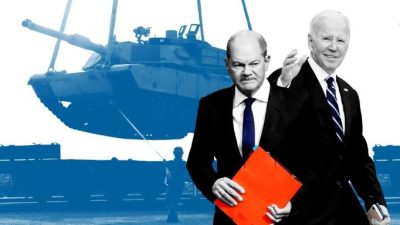Scholz Hardens His Position Against Russia to Preserve His Political Power

All Global Research articles can be read in 51 languages by activating the Translate Website button below the author’s name (desktop version)
To receive Global Research’s Daily Newsletter (selected articles), click here.
Follow us on Instagram and Twitter and subscribe to our Telegram Channel. Feel free to repost and share widely Global Research articles.
***
German media reported that Foreign Minister and Greens leader Annalena Baerbock would challenge Olaf Scholz from the Social Democrats for the Chancellorship since they lost voters because of the government’s handling of the war in Ukraine. This would mean the inevitable collapse of the ruling three-party coalition. Due to this risk, Scholz has hardened his position on the Ukraine conflict to preserve his political power, even if it means more damage to the struggling German economy.
The three-party coalition is led by Social Democratic Party (SPD) Chancellor Olaf Scholz. According to a poll released by Wahlen on February 19, the coalition would likely lose its majority if a Bundestag vote were to be conducted. French weekly Journal du Dimanche, citing a diplomatic source, reported that Baerbock would run as a candidate if the Bundestag was dissolved.
Scholz and Baerbock have major differences on how to approach the war in Ukraine – the most glaring being that Scholz dismissed the possibility of a direct armed confrontation between NATO and Russia while Baerbock said that Europe was already at war.
According to the Wahlen survey, if a general election were immediately held, the opposition conservatives would garner 30% of the vote, making them the strongest party. The survey found that the Greens would maintain 19% support, while the SPD would finish second with 20%. Liberal FDP, the coalition’s minority partner, would hold 5% of the vote.
Indicative of the failure of this three-way-coalition is the fact that German Defence Minister Boris Pistorius received the highest personal approval rating of only 1%. This was followed by Green Party Economy Minister Robert Habeck at 0.9%, Scholz at 0.7%, and Baerbock at 0.6%.
None-the-less, even if such a scenario does occur where Baerbock can present herself as a candidate, she has little chance of becoming the Chancellor. For this reason, there is scepticism, despite a lot of local media reports, that the Greens will break the current coalition to hold early elections as they would most likely lose more power.
Yet again, this would be the logical conclusion to make, something that Baerbock certainly is not. It is recalled that she expressed her belief that Russian President Vladimir Putin can turn around 360 degrees, without noticing the irony, “and make the whole world happy”.
“He [Putin] can decide that he changes his course by 360 degrees tomorrow. The whole world would be happy again,” she added, without realizing that to do a 360 means to end up in the same place that one started.
Given the fracturing of the German coalition, it is noticeable that Scholz has hardened his position against Russia. He said on February 17 that Western countries should deliver battle tanks to Ukraine, falsely claiming:
“We will continue to strike a balance between providing support for Ukraine and avoiding an unintended escalation.”
By providing weapons to Ukraine, Germany is already escalating the conflict. Rather, it is Moscow’s decision on if, when and how it chooses to respond to Germany’s unprovoked aggression.
Berlin’s decision to harden its stance against Russia comes as the Ukraine war is anticipated by the end of the year to cost the German economy, in lost value creation, around 160 billion euros, or some 4% of its gross domestic output.
Given this grim economic reality, Scholz boasted at the Munich Security Conference that:
“We can now say that Germany is the biggest supplier of weapons to Ukraine in continental Europe, and we will continue to be that. It is wise to be prepared for a long war and it is wise to give Putin the message that we are ready to stay with Ukraine.”
In addition, Scholz also committed to increasing German defence spending towards the current NATO target of 2% GDP. For his part, German Defence Minister Boris Pistorius said that he was in favour of raising NATO’s military spending target.
Although it is estimated that the war in Ukraine will drain 160 billion euros from the German economy by the end of the year, according to Marcel Fratzscher, the head of the German Institute for Economic Research, “The Ukraine war and the exploded energy prices cost Germany around €100 billion ($106.8 billion) or 2.5 percent of the economic output in 2022.”
Yet, despite these harrowing figures, Germany plans to prolong the war in Ukraine by providing more weapons. This will mean that any economic recovery will be much slower and painful. Ultimately, this is a decision that Scholz is cynically willing to make to preserve his political power.
*
Note to readers: Please click the share buttons above. Follow us on Instagram and Twitter and subscribe to our Telegram Channel. Feel free to repost and share widely Global Research articles.
Ahmed Adel is a Cairo-based geopolitics and political economy researcher.
Featured image is from InfoBrics

